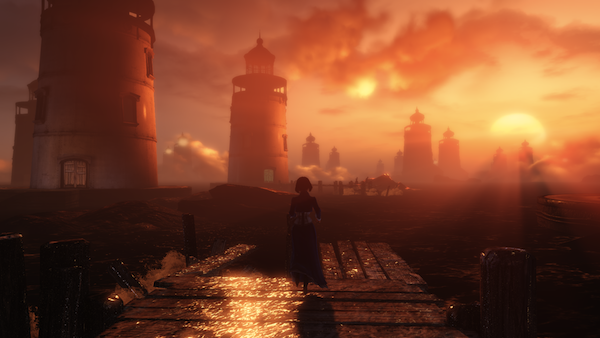Fargo Season 2, Episode 10 “Palindrome”
Written by Noah Hawley
Directed by Adam Arkin
Airs Mondays at 10pm (ET) on FX
How do we find purpose in life? The central question of The Myth of Sisyphus was also the philosophic backdrop for Fargo‘s second season, taking place in a world reeling from the senseless violence of Vietnam, the equally violent civil rights movement, and the increasing dissatisfaction with the way things had turned out after The (Second) Great War had ended. And as everyone reels from the senseless violence of the Sioux Falls massacre – which all started with a confused, angry crime heir and a frustrated hairdresser, as absurd a beginning as one could imagine – that question finds its way into each and every conversation in “Palindrome”, in what turns out to be an understated, quiet, heartwarming, and all-too-brief final chapter of Fargo‘s second season.
In many ways, “Palindrome” acts as checklist, moving from character to character, and watching them reflect on what occurred in the hour before. But it doesn’t begin there; where it begins – and ultimately ends – are with a glimpse into the future, a reminder of all that is to come, as if Malvo’s rebellion against the crime organization employing him had already happened, even though it wouldn’t occur for another forty years. Yet Fargo is less concerned with crime syndicates than it is family – and while the various members of the Gerhardt family bleed out in various places (or in Rye’s case, revert back to their frozen state), we watch as a slowly-expiring crime family falls apart, and then get to see the path of a real family, one that doesn’t work in lies, hierarchies, or backstabbing: Betsy’s “vision” of the future is life-affirming and heartbreaking all at once, detailing the beautiful moments in life she would inevitably miss, closing on a powerful image of Molly, Gus, Greta, the baby, and Lou all sitting around a table, happy and alive.
With that, Betsy realizes there is purpose and meaning to be had in life: those who live without the love of a family, are those who are always left wanting and searching in life. Though Mike Milligan gets to stay alive, his “family” isn’t really there to have his back, dropping him in a forgettable role of middleman, mere minutes after he tells the last remaining Gerhardt henchman (the douche from Buffalo) that he’s become a “king”; the biggest victories feel the emptiest without someone to share it with, and Mike certainly can feel that, alone and scrubbed clean of any sort of unique identity. He’s become part of the shapeless corporate “family” – arguably the greatest evil of all, one that can claim dozens of lives, and yet only represent them as a few numbers on a large spreadsheet.
Of course, there’s also the Blumquist family, who realize just how little of a family they were while Ed sits, bleeding out in a freezer awaiting Hanzee’s impending arrival (of course, he never shows – but we’ll get to him). They were really two completely different people on different life paths; hell, had Ed’s older brother not died in the war, Peggy would’ve never married Ed, and bulldozed over his plan to have a “nice”, quiet life in Minnesota cutting meat and coming home to tater tots for dinner every night. Of course, the idea of ‘family’ is about serving the greater good: the Gerhardt’s couldn’t learn this because of their stubborn hubris, and Peggy couldn’t because of her unhappiness. She may say her and Ed have pulled through the “rough times” now that she’s actualized, but what does her actualization lead to? In the end, she can only wish that her prison cell had a view of the California bay, where she might be able to see a pelican or two, her ambitions as a person coming into their own, crushed by her attempts to leave the person she was with in the dust behind her.
All throughout the hour, “Palindrome” neatly and subtly embodies its title, drawing parallels between seasons and characters in strong ways, with Hanzee at the center of it all. After escaping from the police, Hanzee makes plans to get a new face and change his name, finally finding his way into the “new life” he had been wanting for an undetermined amount of time. And where does that lead him? Obviously not into a place of satisfaction: when we see him in season one, he’s older, fatter, and pissed that Lorne Malvo has taken out a bus driver important to his crime syndicate. A twist a little too clever for its own good? Perhaps – but when you take into consideration the “rocks” this entire season has been captivated with displaying, it’s nice to know even Hanzee was never able to escape it all, perhaps the ultimate punishment for season two’s empathetic antagonist.
Hanzee, Mike Milligan, and Lou Solverson. Three men who wanted three things, and took on the burden/priviledge of making those things happen: Hanzee with his “new life”, Mike with his promotion, and Lou seeing his wife’s medication work. They got exactly that: but in that, they received horrible reminders that as much as they’ve tried to change things, they’ve ended up exactly where they began (it may not read the same backward and front, but the idea of the palindrone being cyclical fits perfectly here). Hanzee will never escape the stress of mob life, even if he’s able to harness the power; Mike will never be the ‘king’ he speaks of; and Lou, even though his heart is in the right place, will never get to see his wife’s cancer cured (even though she didn’t get the placebo), just another inexplicably ironic moment in the FUBAR life of Lou Solverson, which has included murder-y hairdressers, the mystery of cancer, and a motherfuckin’ spaceship (something Hank notes should be left in the sub-text, to which I think we all agree).
Although it feels like “Palindrome” is really going out of its way to make its point about the silly Frenchman (you’re still not done with that book yet, Noreen?), “Palindrome” is a pretty perfect spiritual pair to last week’s fiasco, a two-parter that closes Fargo‘s season in near-perfect fashion. In the end, the only rock pushing up the hill is family – and as it was last season, those who adhere to those simple, iron-clad principles, will come the closest to a happy ending, one that feels like it took place in a life with true meaning. As fun as the mob stories, the stylized violence, and the undeniably addicting accents are, it’s that emotional foundation that makes Fargo so special – I can’t wait to see what happens in Minnesota and its surrounding regions whenever Fargo‘s third season finally makes it on air.
Other thoughts/observations:
- Betsy AND Hank both live through the finale – holy shit!
- Even Mike feels a little guilt about Simone’s passing, putting her baby photo facedown on the table in the Gerhardt’s home.
- “I love yah, I do” – Ed’s damning words.
- Whoo, Mike’s “cruel vs. kindness” speech is cold, and badass.
- Love how Mike ends up sitting in front of a typewriter, where this all began for him just a few weeks earlier.
- Lou, keeping it simple: “Just start at the start, and work your way to the end.”
- Numbers and Wrench are playing on the baseball field, being watched by Hanzee.
- “We’re sitting here together. That’s what matters.”






